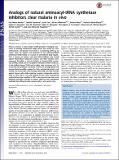Analogs of natural aminoacyl-tRNA synthetase inhibitors clear malaria in vivo
Author(s)
Camacho, Noelia; Tor, Anna; Wilkinson, Barrie; Moss, Steven; Mirando, Adam C.; Francklyn, Christopher S.; Royo, Miriam; Novoa Pardo, Eva Maria; Marin-Garcia, Patricia; Axcarate, Isabel G.; Bautista, Jose M.; Varon, Sonia; Cortes, Alfred; Ribas de Pouplana, Lluis; ... Show more Show less
DownloadNovoa-2014-Analogs of natural a.pdf (1.435Mb)
PUBLISHER_POLICY
Publisher Policy
Article is made available in accordance with the publisher's policy and may be subject to US copyright law. Please refer to the publisher's site for terms of use.
Terms of use
Metadata
Show full item recordAbstract
Malaria remains a major global health problem. Emerging resistance to existing antimalarial drugs drives the search for new antimalarials, and protein translation is a promising pathway to target. Here we explore the potential of the aminoacyl-tRNA synthetase (ARS) family as a source of antimalarial drug targets. First, a battery of known and novel ARS inhibitors was tested against Plasmodium falciparum cultures, and their activities were compared. Borrelidin, a natural inhibitor of threonyl-tRNA synthetase (ThrRS), stands out for its potent antimalarial effect. However, it also inhibits human ThrRS and is highly toxic to human cells. To circumvent this problem, we tested a library of bioengineered and semisynthetic borrelidin analogs for their antimalarial activity and toxicity. We found that some analogs effectively lose their toxicity against human cells while retaining a potent antiparasitic activity both in vitro and in vivo and cleared malaria from Plasmodium yoelii-infected mice, resulting in 100% mice survival rates. Our work identifies borrelidin analogs as potent, selective, and unexplored scaffolds that efficiently clear malaria both in vitro and in vivo.
Date issued
2014-12Department
Massachusetts Institute of Technology. Computer Science and Artificial Intelligence LaboratoryJournal
Proceedings of the National Academy of Sciences
Publisher
National Academy of Sciences (U.S.)
Citation
Novoa, Eva Maria, Noelia Camacho, Anna Tor, Barrie Wilkinson, Steven Moss, Patricia Marin-Garcia, Isabel G. Azcarate, et al. “Analogs of Natural Aminoacyl-tRNA Synthetase Inhibitors Clear Malaria in Vivo.” Proceedings of the National Academy of Sciences 111, no. 51 (December 8, 2014): E5508–E5517.
Version: Final published version
ISSN
0027-8424
1091-6490